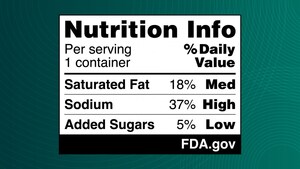SILVER SPRING, Md., April 3, 2018 /PRNewswire/ -- The U.S. Food and Drug Administration (FDA) is alerting pregnant women about the risks of listeriosis, a foodborne disease that can severely affect a pregnant woman and her unborn child.
Listeria can affect all races and ethnic groups, but pregnant women are about 10 times more likely than other people to get listeriosis, due to hormonal changes that affect the immune system during pregnancy. Pregnant Hispanic women are even more likely than the general population to get listeriosis. A pregnant mother may pass Listeria onto her unborn baby without even knowing it, because she doesn't feel sick at all; yet the disease can lead to miscarriage, stillbirth, premature labor, the delivery of a low birthweight infant, a wide range of health problems for a newborn, or even infant death.
The FDA has developed a Community Educator's Guide in English and Spanish to help educate communities about this serious foodborne risk.
Download guide:
https://www.fda.gov/Food/FoodborneIllnessContaminants/PeopleAtRisk/ucm062993.htm
Learn more:
https://www.fda.gov/Food/ResourcesForYou/Consumers/ucm079667.htm-
What Is Listeriosis?
Listeriosis is a foodborne illness caused by eating food contaminated with Listeria bacteria, which are often found in processed foods such as deli meats that have become contaminated, and in soft cheeses or other products made from unpasteurized milk. Unlike many other foodborne bacteria, refrigeration does not stop Listeria from growing. However, cooking and commercial processes like pasteurization do destroy Listeria. So, it is vital for pregnant women to avoid milk products like soft cheeses unless the label says they are made with pasteurized milk.
Pregnant Hispanic Women are at Greater Risk
Pregnant Hispanic women can be at risk for listeriosis because of certain cultural dietary choices. In many Latin American cultures, it is common to eat soft cheeses like Queso Fresco, which are often made from "raw" (unpasteurized) milk. Many women are simply unaware that soft cheeses made with unpasteurized milk can contain potentially deadly bacteria.
In some Hispanic communities in the U.S., people have been known to purchase raw milk and use it to make cheese, and then sell it door-to-door. Unlicensed vendors also sell it from carts. This cheese can sometimes also be found in small neighborhood stores.
Symptoms of Listeriosis
Listeriosis can cause fever, chills, muscle aches, nausea, and diarrhea, or upset stomach. If infection spreads to the nervous system, it can lead to headaches, stiff neck, confusion, loss of balance, or convulsions. In extreme cases, death or miscarriages can occur.
Preventing Listeriosis in Pregnant Women
The FDA advises all pregnant women not to eat soft cheeses unless they are made with pasteurized milk and to follow these additional tips to avoid the illness:
Do NOT eat:
- Soft cheeses (such as Feta, Brie, Camembert, Blue-veined cheeses, and Hispanic-style cheeses such as Queso Blanco, Queso Fresco, Asadero, and Panela) – unless they're made with pasteurized milk
- Hot dogs and luncheon meats, unless they're reheated until steaming
- Refrigerated pâtés or meat spreads
- Refrigerated smoked seafood – unless it's in a cooked dish, such as a casserole
Contact: Media: 1-301-796-4540 Consumers: 1-888-SAFEFOOD (toll free)
SOURCE U.S. Food and Drug Administration
WANT YOUR COMPANY'S NEWS FEATURED ON PRNEWSWIRE.COM?
Newsrooms &
Influencers
Digital Media
Outlets
Journalists
Opted In






Share this article